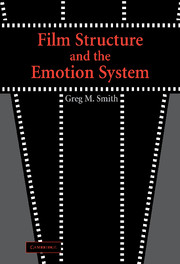Book contents
- Frontmatter
- Contents
- Film Structure and the Emotion System
- PART ONE DEVELOPING THE APPROACH
- PART TWO ANALYZING EMOTIONAL APPEALS IN FILM
- 5 “Couldn't You Read between Those Pitiful Lines?”: Feeling for Stella Dallas
- 6 Strike-ing Out: The Partial Success of Early Eisenstein's Emotional Appeal
- 7 Lyricism and Unevenness: Emotional Transitions in Renoir's A Day in the Country and The Lower Depths
- 8 Emotion Work: The Joy Luck Club and the Limits of the Emotion System
- 9 “I Was Misinformed”: Nostalgia and Uncertainty in Casablanca
- PART THREE AFTERWORD
- APPENDIX. The Neurological Basis of Psychoanalytic Film Theory: Metz's Emotional Debt to Freud the Biologist
- Notes
- Index
6 - Strike-ing Out: The Partial Success of Early Eisenstein's Emotional Appeal
Published online by Cambridge University Press: 27 July 2009
- Frontmatter
- Contents
- Film Structure and the Emotion System
- PART ONE DEVELOPING THE APPROACH
- PART TWO ANALYZING EMOTIONAL APPEALS IN FILM
- 5 “Couldn't You Read between Those Pitiful Lines?”: Feeling for Stella Dallas
- 6 Strike-ing Out: The Partial Success of Early Eisenstein's Emotional Appeal
- 7 Lyricism and Unevenness: Emotional Transitions in Renoir's A Day in the Country and The Lower Depths
- 8 Emotion Work: The Joy Luck Club and the Limits of the Emotion System
- 9 “I Was Misinformed”: Nostalgia and Uncertainty in Casablanca
- PART THREE AFTERWORD
- APPENDIX. The Neurological Basis of Psychoanalytic Film Theory: Metz's Emotional Debt to Freud the Biologist
- Notes
- Index
Summary
As I noted in the desiderata in the introduction to this book, an approach to analyzing the emotional appeals of film narration should be able to explain not only how certain texts such as Stella Dallas successfully evoke emotion in audiences but also why certain texts are less successful in their emotional appeal. A useful methodology must not be blatantly prescriptive, emphasizing certain modes of narration and trying to fit alternative modes into that norm. Nonetheless, the fact remains that some texts (or portions of texts) are not particularly well structured to appeal to the emotions. They make demands on the viewer that are counter to the basic structure of the emotion system as outlined here, making it less likely that audiences (regardless of their preferences for Raiders of the Lost Ark or Stranger than Paradise) will experience emotional responses.
Of course it is impossible to say that a portion of a text is utterly without emotional appeal, given the range of individual variation in viewer's emotional makeup. One may respond to a work based on highly idiosyncratic, personal associations made with a text (e.g., because the film was shot in one's childhood neighborhood). But it is possible to say that the narration's appeal is more or less well structured to appeal to an audience that has the appropriate cinematic knowledge of genre schemas, narrative norms, and so forth.
- Type
- Chapter
- Information
- Film Structure and the Emotion System , pp. 108 - 121Publisher: Cambridge University PressPrint publication year: 2003



